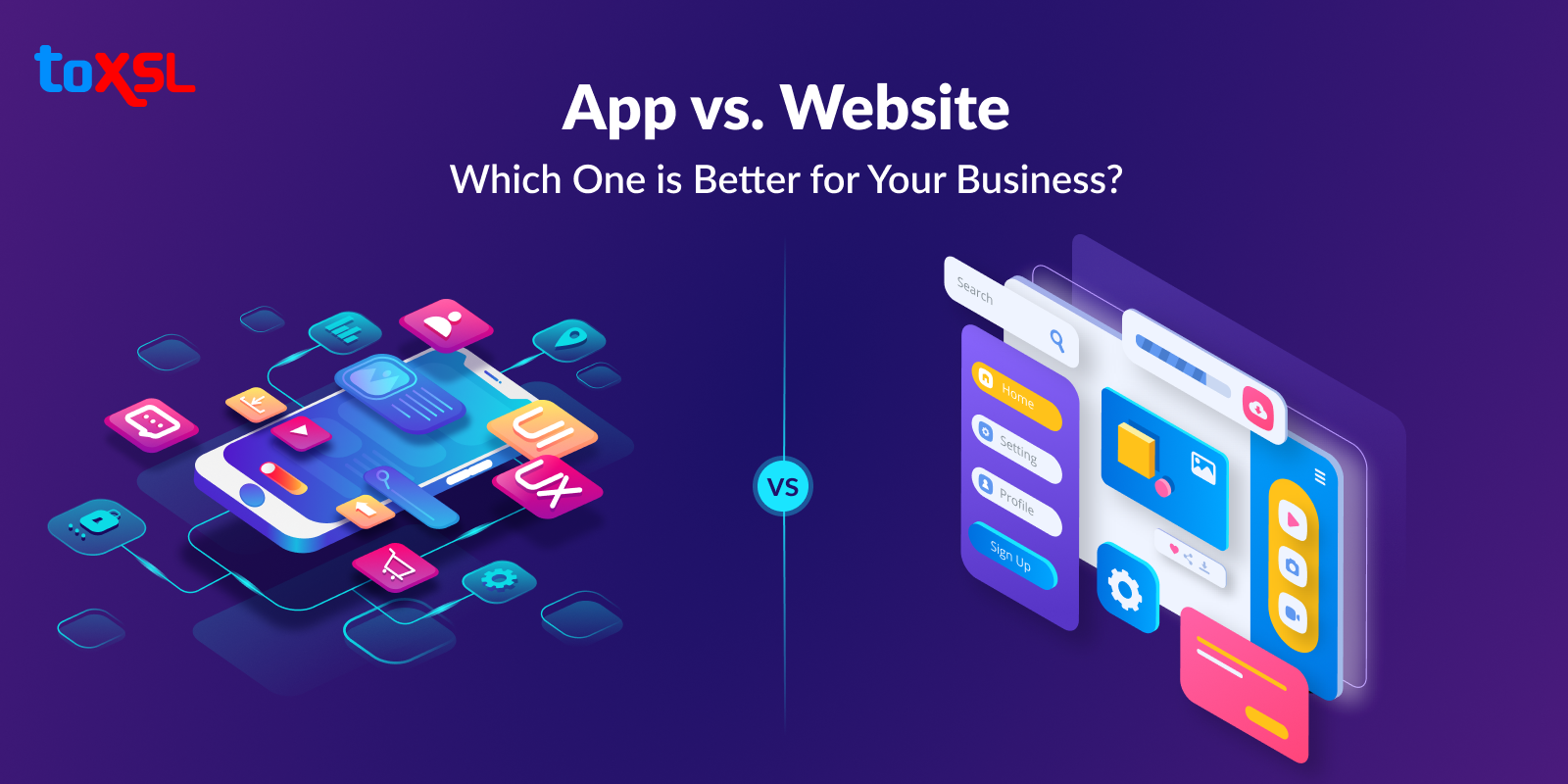- Jun 28, 2024
Share this post on:

With the advancement of Mobile Technology, it has become a matter of continuous debate to all business owners what should be best for their business.
Whether to develop a separate mobile application or transform your existing website, the solution for most of the time is ambiguous. However, if you think with your mind and not with your intelligence (the difference is negligible though), firstly you have to decide why you want to optimize your design.
The following points will chalk out the reasons behind your decision:
To keep business updated:
When you are running a profitable business, it becomes important for you to keep track of all the latest trends and updates in technology. Creating mobile-optimized websites is the latest technology in the industry which is getting positive responses from all over the world.
To enhance user experience:
With advancing technology and high-speed internet, users are becoming more and more impatient towards slow-loading pages and continuous clicking and zooming.
They tend to drift away in seconds which increases bounce rates affecting your website ranking adversely.
Moreover, the mobile industry surveys have revealed that the 10-11% percentage of mobile web users in or around 2010-11 have covered 30% of global internet users today. Hence, to achieve a high-quality user experience, you need to make your website accessible from all devices.
Mostly, these are the two main reasons for which all companies are bound in hiring expert website designers, thoroughly updated with the knowledge of new design approaches.
Now, coming to the main part, how will you decide what will enhance user experience more?
What will decrease bounce rates, and exclusively designed mobile application or a simpler, cost-effective solution of creating a responsive website which can be viewed from all devices?
The answer is dependent solely on the type of business you want to do with your website; whether you want to sell products, provide content, or give information about your services and products.
Mobile Applications:
For any app design, it is highly recommended developing separate mobile applications for your website. A responsive design, though it is both cost and time effective, fails to trigger buying interest in the minds of customers.
For that, you need to provide an exclusive and high-quality user experience. Moreover, responsive websites generally prefer the top to bottom scrolling while mobile users are likely to scroll from left to right while viewing products and prices which are provided by mobile applications.
Not only that, but mobile apps are also designed carefully to support easy transactions and convenient online shopping. On the other hand, an all-device responsive website will fail to meet the expectations of maximum users under these sections.
The advantages of mobile applications over-responsive website designs for e-commerce sites are summarized below:
- Side-scrolling
- Saves time and requires minimum effort
- No chance of missing important content
- Exclusive and enhanced user experience
- Smooth transactions
- Online payment made easier
Responsive Websites:
In other words, to make your website responsive is an attempt to increase traffic and potential customers, irrespective of the devices they are using to view your website.
In a responsive design, a single code is required to develop the website and a single link or URL is used to view it from all devices. This significantly cuts down the expenses of creating an exclusive application for mobile web users.
However, as said earlier, responsive websites do have some limitations like page loading problems, chances of missing important content in a hurry, and payment difficulties. Hence, they are generally not applicable to e-commerce sites.
Nevertheless, a responsive website is held in high esteem by the search engines, especially Google. Therefore, if a website is responsive, it tends to rank higher in the SERPs (Search Engine Result Pages) than its non-responsive counterparts.
Moreover, responsive websites follow a grid pattern of layout and adjust themselves with increasing or decreasing skin resolutions which enhances the user experience when they view it from their respective tablets, tabloids, and iPads.
It is the best applicable for content related sites, corporate or business websites, blogs, and other informational sites. Responsive design is crucial for business websites as they create the same impression from all kinds of devices, in contrast to separate web applications.
The most significant advantages of responsive website designs are jotted below:
- Easy to update information
- Users can view the website effectively from all mobile devices without confusion.
- Cost-effectiveness
- Simple and enhanced appearance, irrespective of the device used,
- Single URL-based website,
- Adjusts to all screen sizes and resolutions,
- One single code is used to develop the website,
- Changes need not be made for the different versions of a single website.
- Provides a significant cut down in maintenance costs
You can read more about, How Good Website Design Can Unlock The Business Success [Must Read]
How To Attract and Retain More Of Your Customers?
Many of you already have websites that are (hopefully) integrated with your offline advertising channels (radio, billboard, newspaper, magazines, direct mail), and you probably generate a substantial part of your traffic and leads through this channel.
What if I were to tell you that Google has made a game-changing, strategic move that could reduce your online leads, traffic, and profits considerably within the next 2 - 5 years if you do NOT pay attention to the implications of that move?
Google spent $12.5Billion last year to acquire Motorola Mobility, and this acquisition was so strategically important that Google spent more than 41% of its free cash on the deal. Now, why would Google bet almost half its cash to make this deal? Is this acquisition telling you something about the future of the internet that WILL have a profound impact on your business if you ignore it?
Note that, Google almost OWNS the internet today, but was willing to bet nearly half of its cash to get into the mobile app design solutions playing field!
Do you want to bet your businesses' future against Google's signal that the world is going mobile?
To understand why to consider these facts:
The Whole World Is Going MOBILE!
- There are 1.1billion smartphones worldwide and growing rapidly
- There are 5.2Billion mobile phones worldwide and growing rapidly
- In the US, about 25% of mobile web users are mobile ONLY!
- About 80% of US households have mobile phones
- About 83% of people go online to find a business
- A whopping 10% of Google's page views are mobile
Bottom Line: Mobile apps are now replacing websites. And if you are not thinking about or taking steps TODAY to integrate your existing websites with mobile, you will slowly find yourself out of business!
So What Do You Do?
Fortunately for the small to a medium-sized business person, there is still time to act, even though the window is fast closing! There are a few, affordable, scalable, and functionally powerful; cross-platform mobile app solutions on the market for you.
What Features Must You Look For In Your App?
Your App Must Have Cross-Platform Capability - Must work on iPhones, iPads, Android, Windows, BlackBerry and if you can afford it, Kindle and Nook!
- Push Notification
This feature allows you to send unlimited offers/coupons to ALL your customers who have opted to download your app (at NO additional charge)!
And by the way, the open rate on push notifications is 97% within 5 minutes, vs. only 4% for emails and even lower for newsletters!
- GPS Direction
One tap by your customer; and directions to your business is displayed!
Quick Response (QR) Coupons - Can be used to download your apps and also as a 'frequent buyer" card similar to the paper cards used by coffee shops, etc.
- Tap To Call
One tap and device calls your business, no more fumbling to find a # and dial.
- Tap To Email
For your newsletter, etc.
- Mobile Ordering Platform
Should integrate with your existing platform (if you already have one).
- Shopping Cart Feature
Should integrate with your existing platform.
- Mobile Reservation
Should integrate with your existing platform
Finally, WHY Should You Consider Getting An APP?
- Their smartphone is within reach 24/7
- It Is A Question Of ROI And Profitability- Your app will help you better integrate and tie together ALL your online and offline marketing channels. And reduce your advertising seepage!
- 97% of them will open/read your messages/coupons or offers within 5 minutes, vs. only 4% for email (within 24hrs)
- You will reduce advertising expense seepage, and with the same amount of ad spend, you should expect to get more customers, keep your existing customers coming back more often and buying more often from you.
- Constant Branding - You are right ON your customers' smart mobile device 24/7!
- Your websites must be integrated and connected to your mobile apps.
- An app allows you to have a one on one intimate communication with your customers
Hence, you can see that both technologies are highly effective in taking your business to the next level. However, it is always better to seek professional advice while taking such important decisions regarding your business.











